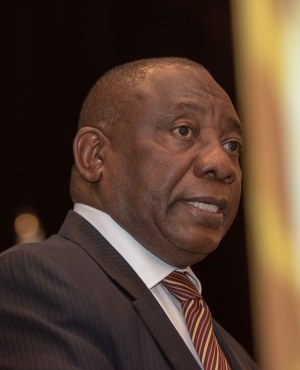
President Cyril Ramaphosa (GCIS)
Multimedia · User Galleries · News in Pictures Send us your pictures · Send us your stories

President Cyril Ramaphosa (GCIS)
Multimedia · User Galleries · News in Pictures Send us your pictures · Send us your stories

Can Cyril Ramaphosa's "New Deal" also become a little more innovative, please?
Our very stability is being threatened by high levels of inequality and poverty. Accountability and clean government are now back on the table after tens of billions of rands had been stolen or wasted during the Zuma regime, but it's too late for a slow recovery. People are too angry and frustrated to wait.
There are some things government can do quickly. Like stopping the bleeding at state-owned enterprises. I just read yesterday that SAA, a pure vanity project by the state, has run up a net loss of R18,1bn the last ten years.
We can't control commodity prices or trends in the global economy, but we can start being innovative and more energetic and figure out new ways of employing people and drawing in more citizens into the economy.
Let me give two examples.
I recently stayed at a world-class nature reserve outside Grahamstown. The manager explained to me that the reserve consists of three struggling cattle farms that had been fenced and stocked with game.
From a dozen or so lowly-paid employees the enterprise now pays well over a million rand in salaries every month, all to local people. It lifted several hundred people from deep poverty right into the middle class. It is a high-end resort, so mainly foreign tourists go there and they pay serious money, money that change local communities.
This exercise can be repeated fifty times over in the astonishingly beautiful but depressingly poor Eastern Cape, preferably through joint ventures between the private sector and national or provincial parks boards. It could form part of a radical new land reform programme. The same exercise can be repeated in parts of Mpumalanga and KwaZulu-Natal.
Tourism can be South Africa's giant diamond mine. But we only receive just over 10 milion tourists per year, compared to Greece's 29 million, Thailand's 32 million, Austria's 37 million and Spain's 75 million. We can, and should, double our number of tourists in the next five years.
Every tourist that arrives translates into several local jobs.
South Africa has a weak currency, splendid natural beauty, a sophisticated infrastructure, a complete absence of terror attacks and is almost completely malaria free.
We have hardly started exploiting the massive and growing Chinese market and can do a lot better with countries such as India, Russia and Japan.
There's your challenge, Derek Hanekom. Be bold and innovative. Make things happen.
Another example.
There is a hemp revolution happening in Canada and the United States. Not dagga, but its cousin plant from the cannabis family with virtually no psychoactive ingredients. It is used for clothes, for upper-end car door panels, in aircraft insulation and dozens of other applications.
I read in an American agriculture magazine recently that growing hemp takes half the water that wheat does but provides four times the income. Canadian hemp farmers clear a profit of $250 per acre, while that figure for soy is $71.
But here's the thing. Some of our rural communities along the east coast and elsewhere have been cultivating dagga for centuries – in fact, the records show that the Khoisan partook of marijuana long before the first Europeans settled at the Cape. Growing marijuana is not much different than growing hemp plants.
But, despite the fact that you can't get high when you smoke hemp, it is still illegal in South Africa. That's pure silliness.
Granting licences to, say, 50 000 smallholder farmers to grow hemp while the state, with private enterprise, establish factories to turn that into fibre products for export and local use, could potentially lift almost a million people from poverty within a short period of time.
In fact, I think South Africa should legalise dagga for recreational and medicinal use. This has happened in eight US states, Canada and Uruguay, and will be done in many more countries in the decade ahead.
If this is done, I would support the proposal of some activists that licences to grow dagga at scale be given only to smallholder farmers in areas where dagga have been traditionally grown. If done correctly, it will deliver a million people into the comfortable middle class in no time. If not so restricted, big business will monopolise the industry.
These are just two ideas of fresh, new thinking that could get South Africa out of the rut it is in. There must be many more.
All it needs is imagination and political will.
Disclaimer: News24 encourages freedom of speech and the expression of diverse views. The views of columnists published on News24 are therefore their own and do not necessarily represent the views of News24.